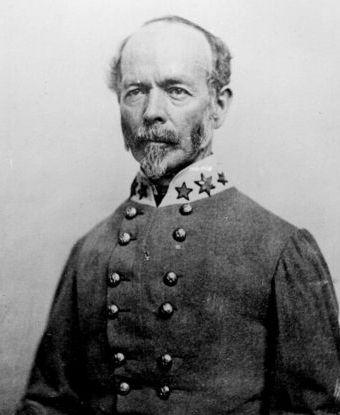Last updated: June 18, 2015
Person
Joseph E. Johnston

Joseph Eggleston Johnston was a West Point graduate and career U.S. Army officer, serving with distinction in the Mexican-American War and Seminole Wars, and was also one of the most senior general officers in the Confederate States Army during the American Civil War.
Johnston was trained as a civil engineer at the U.S. Military Academy. He served in Florida, Texas, and Kansas, and fought with distinction in the Mexican-American War and by 1860 achieving the rank of brigadier general as Quartermaster General of the U.S. Army. When his native state of Virginia seceded from the Union, Johnston resigned his commission, the highest-ranking United States officer to join the Confederacy. To his dismay, however, Jefferson Davis made him only the fourth highest-ranking officer in the Confederate army.
Johnston was the senior Confederate commander at the First Battle of Bull Run on July 21, 1861 where his direction of arriving reinforcements throughout the day was one of the keys to the Confederate victory and which contributed to his promotion to full general the following month. In the spring of 1862, Johnston defended the Confederate capital of Richmond during the Peninsula Campaign, executing a series of tactical withdrawals up the Virginia Peninsula under pressure of a superior force under Union Gen. George B. McClellan. Seizing the offensive at the Battle of Seven Pines on May 31, 1862, Johnston was severaly wounded and his commandewas given to his West Point classmate, Robert E. Lee.
Returning to service in November 1862, Johnston was given command in the Western Theater. He was criticized for his failure to prevent the capture of Vicksburg, Mississippi in July 1863. His long-simmering feud with Confedeate President Jefferson Davis came to a head in the wake of the Atlanta Campaign, where Johnston was relieved of his command by Davis after allowing William T. Sherman's Union army to reach the outskirts of Atlanta unchecked. In the final days of the war, he was given command of the small remaining Confederate forces in the Carolinas and surrendered his armies to Sherman on April 26, 1865.
After the war Johnston served as an executive in the railroad and insurance businesses, served a term in Congress and was commissioner of railroads under President Grover Cleveland. On March 21, 1891, Joseph E. Johnston died of pneumonia, contracted while serving as pallbearer for his former adversary, William T. Sherman.
